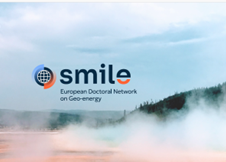
|
SMILE is a Marie Sklodowska-Curie doctoral network supported by the European Union's Horizon Europe framework program with the objective to train a new generation of young researchers for the successful deployment of subsurface low-carbon energy sources. The deployment of geothermal energy, and subsurface storage of energy and CO2 can help fight climate changes and limit the temperature increase as laid out in the Paris Agreement. However, some early geo-energy projects have occasionally developed unpredicted consequences, such as felt and damaging induced earthquakes, dampening public perception on geo-energies. The various processes involved in geo-resources exploitation (e.g., hydraulic, geomechanical, geochemical and thermal effects) imply complex interactions that cannot be predicted without considering the dominant coupled processes. SMILE seeks to overcome these obstacles in the development of geo-energy solutions by comprehending and forecasting linked processes. The trained researchers will have the ability to suggest creative ways to ensure that subterranean low-carbon energy sources are successfully deployed while safeguarding related ecosystems and groundwater. Doctoral candidates undergo interdisciplinary training in experimental, mathematical, and numerical modeling of coupled processes, upscaling techniques, and ground deformation monitoring using field data from pilot tests and industrial sites, enhancing their applicability in academia, industry, and public sector.
SED's participation in SMILE aims to develop an experimental study on the interaction between reactive pore fluids and rock matrix in caprocks and reservoir rocks. Data are collected at lab scale (e.g. the Rock Physics and Mechanics Lab, ETH Zurich) and in situ at pilot projects (e.g. Mont Terri, Bedretto Underground lab, as well as at Icelandic CO2 storage facilities), aiming to link mechanical/hydraulic parameters and fluid-rock interaction. The goal is to create a comprehensive dataset on geomechanical parameters related to fluid-rock interaction in caprock/reservoir rocks, which will be used in numerical simulations. |
|---|---|
| Project Leader at SED | Alba Zappone, Antonio Pio Rinaldi, Claudio Madonna |
| Funding Source | Horizon Europe program; State Secretariat for Education, Research and Innovation SERI |
| Duration | 2023-2027 |
| Keywords | Geothermal energy; geological carbon storage; technological development |
| Research Field | Geomechanical Modeling, Induced Seismicity, Laboratory Seismology |
| Website | https://smile-msca-dn.eu/ |